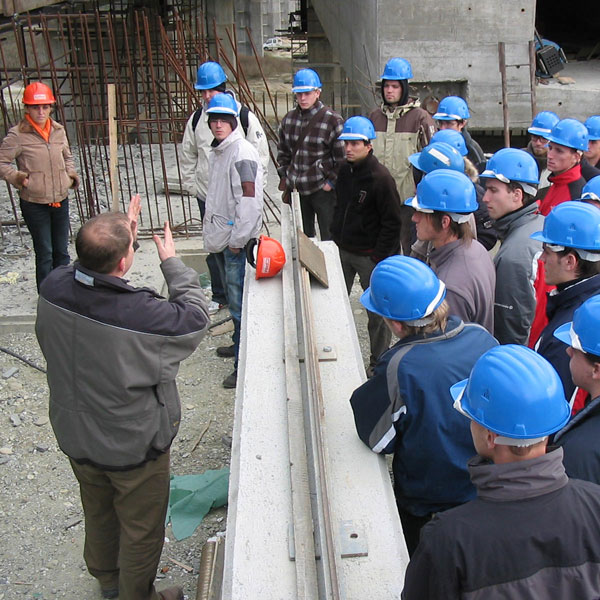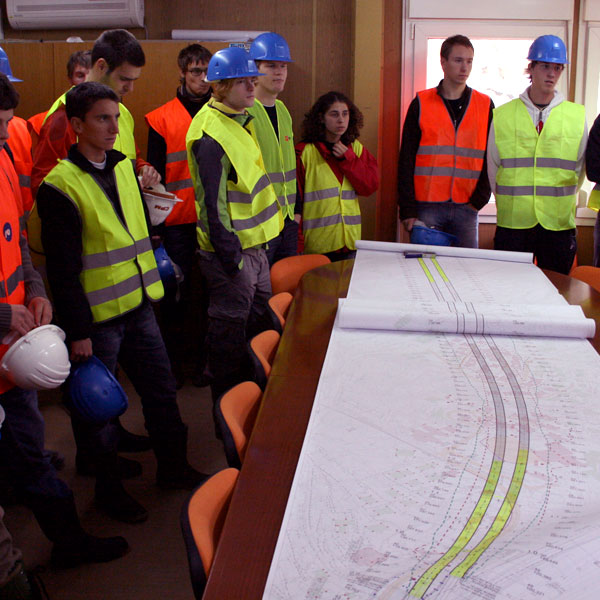
1st Cycle Study: Civil Engineering BA
The space where we live is interwoven with building structures. Not only buildings, where we live and work, but also roads, tracks and bridges that lead us to them. We should also not forget the power structures and municipal infrastructure that take care of the required supply. For this reason, our space needs careful planning, construction and arrangement, and civil engineering is for this reason a promising activity in any moment of time.
Graduate of the first cycle academic study program Civil Engineering acquires the title DIPLOMIRANI INŽENIR GRADBENIŠTVA (UN) – BACHELOR OF CIVIL ENGINEERING (ACAD.).
places for academic study program Civil Engineering (BA)
Basic goals of the programme
- The graduate acquires general basic knowledge and understanding in the wider area of civil engineering.
- The graduate is motivated for further study at the postgraduate level.
- The graduate understands the creative relation necessary for designing built environment in natural or existing urban environment.
- The graduate has wider knowledge of civil engineering allowing interdisciplinary connection with several other areas.
- The graduate acquires education comparable to related study programmes in Slovenia and in wider European area.
- The student is allowed to change to related undergraduate studies.
- The programme is harmonised with the principles of the Bologna Declaration and follows the recommendations by EUCEET and the FEANI Engineering Association.
- Progression conditions and educational practices that encourage regular study as well as the tutorship system assure good progression rate of the students.
General competences
General competences of the graduate after the finished university bachelor degree programme of Civil Engineering are mainly the following:
- Ability to define, understand and creatively solve professional challenges.
- Development of the ability of critical, analytical and synthetic thinking.
- Development of professional responsibility and ethics.
- Skills related to professional understanding and written expression, including the use of foreign technical language (beside literature reading, this competence is supported by lectures of foreign visiting professors, field trips abroad, work on projects in cooperation with foreign partners; unfortunately, the legislation prevents larger scope of teaching activities/courses in English).
- Ability to use information-communication technology.
- Ability to use the acquired knowledge for independent solving of technical problems in civil engineering.
- Ability to find sources, critically evaluate information, independently upgrade the acquired knowledge and deepen the knowledge in individual specialised areas of civil engineering.
- Ability to establish interdisciplinary connections.
- Taking into account the aspects of safety, functional, economic and ecological principles at work.
Course-related competences
The graduate of the first cycle study of Civil Engineering acquires mainly the following course-related competences:
- Mastering fundamental theoretical knowledge essential for the technical field of civil engineering.
- Managing the basic professional knowledge from the area of civil engineering and essential complementary sciences (geology, geodesy, organisation of works, information science).
- Basic qualifications in the area of civil engineering that allow continuation at the second cycle study.
- Ability to individually acquire new skills.
- The graduate is capable of individual performance of less demanding works and solving individual well defined tasks in civil engineering in the areas of design and realisation of works (for buildings as well as engineering structures), spatial planning, laboratory testing of building materials, etc., and is as such a good co-worker in a wider expert team, although generally not capable of independent project management.
- Specific competences are given within the description of individual subjects (see study plans).
Knowledge and skills required for the admission to the program
Knowledge conforming in contents and scope to the contents of the courses in the programme Civil Engineering may be acknowledged. The recognition of knowledge and skills acquired before the enrolment is subject to the decision by the Study Board of the Department of Civil Engineering of UL FGG based on student’s written application, certificates and other documents proving successful acquisition of knowledge and the contents of the knowledge, and in accordance with the Rules on procedure and criteria for the recognition of informally acquired knowledge and skills, adopted at the 15th meeting of the Senate of UL, 29. 5. 2007.
Advancement conditions according to the program
Conditions for progression from one year to another
Student can enrol in the second year if, by the end of the academic year, he/she has fulfilled the prescribed obligations and achieved 54 ECTS credits from the first year. Student can enrol in the third year if, by the end of the academic year, he/she has fulfilled the prescribed obligations and achieved at least 54 ECTS credits from the second year and completed all the prescribed obligations and achieve 60 ECTS credits from the first year.
Considering the conditions from the above paragraph, students may also enrol to the next year when they accumulate at least 45 credit points according to ECTS. The UL FGG Commission for solving student applications decides on exceptional enrolment.
Faculty of Civil and Geodetic Engineering has been offering tutorship and supervision for its students for several years. From the very first year students have designated supervisors for each class, and smaller groups of students can also have individual tutors consisting of teachers or students from higher classes, who help them select orientation, elective courses, etc.
A student who shows above-average academic results in his/her studies is given the opportunity to advance faster. The decision on this is made by the Dean of UL FGG on the basis of the candidate’s application and the reasoned opinion of the Study Board of the UL FGG Department of Civil Engineering. The decision determines the method of faster advancement.
Conditions for repeated enrolment in the same year
Failing to meet all the obligations defined by the study programme for the advancement in the next year, students may enrol in the same year for the second time, provided that they have obtained at least 30 credit points according to ECTS.

Requirements for completion of the study
Students finish the study by accomplishing the foreseen obligations totalling 180 credit points according to ECTS, including practical training and diploma thesis.
Transfer between study programmes
Transfer between programmes shall mean termination of education in the student’s original study programme (first programme) and continuation of education in the first cycle academic study programme of Civil Engineering (second programme), in which a part of the completed study requirements from the first study programme are recognised as completed.
Transfers are possible from the first cycle study programmes, and until their expiration also from the undergraduate study programmes adopted after June 11 2004, where the competences of the finished studies are comparable and according to the acknowledgement criteria at least half of the obligations according to ECTS from the first study programme related to compulsory courses of the second study programme can be acknowledged. Considering the scope of acknowledged obligations from the first study programme in the Republic of Slovenia or abroad student may enrol to the same or higher year in the second study programme. Transferring students shall fulfil the conditions for the enrolment to the second study programme.
Applications of candidates for the transfer to the first cycle academic study programme Civil Engineering and the scope of acknowledged obligations in the study programme will be examined individually by the Study Board of the Department of Civil Engineering. If in the procedure of acknowledging obligations for the purpose of transfer the candidate is approved at least the amount of credit points and those point that are required for the enrolment to a higher year of the first cycle academic study programme Civil Engineering, the candidate may enrol to the higher year of the first cycle academic study programme Civil Engineering.
Methods of Assessment
Knowledge is examined and evaluated in individual courses. Accordingly, the teaching process in each course finishes with the examination of knowledge and acquired skills. The forms of knowledge testing (oral or written examinations, preliminary examinations, seminar works, work logs, practical assignments, projects, portfolios, peer evaluation) are defined in the study plans of individual courses. General rules of knowledge testing are regulated by the Rules on the first and second cycle studies at the UL FGG, adopted by the Senate of FGG. The details are defined by the Study Regulations.
The student receives a single grade of the exam, consisting of foreseen required obligations in each course. Each obligation shall be evaluated with a positive grade.
Knowledge from preliminary and partial examinations, seminars, seminar works, work logs, practical projects, home projects, homework and similar amounts to at least 30 % of the total grade.
According to the Statute of the University of Ljubljana the following grading scale is used:
10 – (91–100 %: excellent: exceptional results with negligible mistakes),
9 – (81–90 %: very good: above average knowledge with few mistakes),
8 – (71–80 %: very good: sound outcomes),
7 – (61–70 %: good: good knowledge, but with significant shortcomings)
6 – (51–60 %: sufficient: performance meets the minimum criteria),
5 – (50 % and less: unsatisfactory: performance does not meet minimum criteria).
The candidate's performance is considered successful for grades from satisfactory (6) to excellent (10).
Possibilities of elective courses and mobility
Five elective courses are foreseen:
- two external elective courses in the 4th semester (4 ECTS) and in the 6th semester (8 ECTS) and
- elective module (Hydraulics, Municipal Engineering, Structures, Traffic and Buildings) consisting of 3 courses (5+4+4 ECTS) in the 6th semester.
Students can select external elective courses from any study programme at the University. Nevertheless, a list of elective courses is proposed also within the study programme Civil Engineering from the area of law, economy, administration, communicology, foreign languages, as well as specialised courses from the technical and natural sciences. At UL FGG students may also select courses from other study programmes: Geodesy and Geoinformatics, Technical Real Estate Management, Water Science and Environmental Engineering and Buildings.
Student may transfer 30 ECTS points of the programme (one study semester) from any other area of civil engineering, provided there exists an adequate agreement signed with UL FGG. As students are required to pass the mandatory exams at the institution of enrolment, such exchange is most appropriate in the 6th semester of the study

Study programme courses – Civil Engineering (BA)

All study programmes on Faculty of Civil and Geodetic Engineering are internationally certified from 2015 to 2021.
